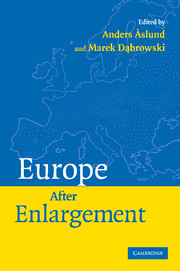Book contents
- Frontmatter
- Contents
- List of Charts, Tables, and Boxes
- Contributors
- Acknowledgments
- Introduction
- 1 Has Europe Lost Its Heart?
- 2 Economic Implications of the Social Provisions of the Stalled EU Constitution
- 3 Fiscal Policy and Fiscal Rules in the European Union
- 4 Design and Implementation of the Stability and Growth Pact: The Perspective of New Member States
- 5 Perspectives on the Lisbon Strategy: How to Increase European Competitiveness
- 6 Is Europe Reforming? Evidence from Cross-Country Structural Indicators
- 7 Recovery Growth as a Stage of Post-Socialist Transition
- 8 Comparative Oligarchy: Russia, Ukraine, and the United States
- 9 The Economic Rationale of the “European Neighbourhood Policy”
- 10 Economic Integration of Eurasia: Opportunities and Challenges of Global Significance
- Index
- References
1 - Has Europe Lost Its Heart?
Published online by Cambridge University Press: 04 December 2009
- Frontmatter
- Contents
- List of Charts, Tables, and Boxes
- Contributors
- Acknowledgments
- Introduction
- 1 Has Europe Lost Its Heart?
- 2 Economic Implications of the Social Provisions of the Stalled EU Constitution
- 3 Fiscal Policy and Fiscal Rules in the European Union
- 4 Design and Implementation of the Stability and Growth Pact: The Perspective of New Member States
- 5 Perspectives on the Lisbon Strategy: How to Increase European Competitiveness
- 6 Is Europe Reforming? Evidence from Cross-Country Structural Indicators
- 7 Recovery Growth as a Stage of Post-Socialist Transition
- 8 Comparative Oligarchy: Russia, Ukraine, and the United States
- 9 The Economic Rationale of the “European Neighbourhood Policy”
- 10 Economic Integration of Eurasia: Opportunities and Challenges of Global Significance
- Index
- References
Summary
Introduction
Once upon a time Europe was a small group of like-minded countries, determined to integrate politically and economically in order to eliminate war. After centuries of recurrent devastation, this was an ambitious project. It was built on Jean Monnet's prudent step-by-step strategy, now called neo-functionalism. Integration always progressed in fits and starts, but achieved amazing results. Not only is war all but ruled out, but also economic and political integration has deepened to a degree undreamt-of even by most Euro-enthusiasts. More amazing still, the project has spread. Nearly the entire continent is now part of the Union, and Turkey might join by the end of the decade. Two hundred million people share the same currency and enjoy borderless travel.
But success has its price. Twenty-five countries do not cooperate as six used to. Each enlargement gives the impression that the undertaking is being diluted, resulting in more weight given to national interests and less willingness to take the next integrative step. This perception is misguided. The EU-25 group is considerably more integrated than the original EU-6 ever was. Enlargement does not cause dilution, but it brings to the fore institutional failures that were present all along.
Now Europe needs to clean up its institutions and practices. Fifty years of negotiations have led to agreements both good and bad. Some of the old acquis communautaire is outdated. The European Constitutional Convention offered a unique opportunity to sort out this legacy, but this opportunity has been squandered.
- Type
- Chapter
- Information
- Europe after Enlargement , pp. 6 - 28Publisher: Cambridge University PressPrint publication year: 2007
References
- 2
- Cited by

